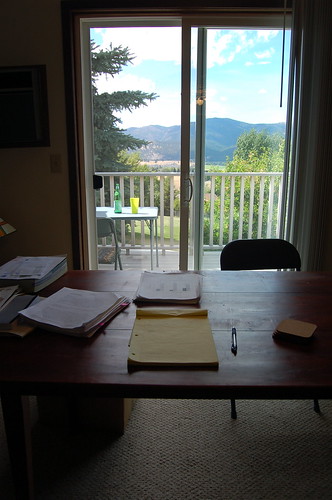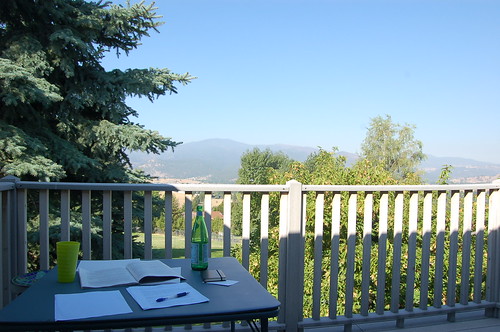1. The Cult of Customer Service
When I talk about “how nice the people here are,” what am I really saying?
How not nice the people are somewhere else, I suppose.
Maybe also how different people’s lives are somewhere else.
I notice how nice the people here are when I bring my broken cell phone in to the Verizon store to find out if it’s still under warranty, and the happy-looking blonde woman behind the counter seems as enthusiastic about helping me with this problem as she would about the prospect of a commission sale. I notice how nice the people here are when I have to call the Vann’s Outlet store because I (mistakenly) think there is something wrong with our new washing machine, and the grandmotherly voice on the other end of the line not only spends time troubleshooting the problem with me but, when we are done, positively beseeches me to call back if her suggestions don’t help.
I notice how nice the people here are, among other times, when someone with whom I am doing business appears genuinely glad to be doing business with me. What I am noticing is the thing popularly known as good customer service, and I am noticing it because I had gotten used to not encountering it when I lived in Baltimore.
These days good customer service is more commonly talked about in its absence, like the woman traveling with her husband and two children who arrived at her gate a little late recently at the Denver International Airport, only to learn that United did not intend to let her board. (At least there was still a gate agent she could yell at.) At the end of her tirade (which got her onto the plane, by the way), she concluded with something that, it was clear, she felt United and its representatives would not want to hear: “Worst customer service ever!”
I hear this sort of thing all over. The man behind me in line talking on his cell phone, critiquing the customer service he is getting as though he were a management consultant paid for his opinion. My friend, frustrated at a disagreement with an auto dealership’s service department over the warranty protection for his brakes: “Where I come from, the customer is always right. I mean, that’s just basic customer service.”
When did this idea of “customer service” take such a strong hold over us all? When did we start to believe that we deserved only the best treatment, by default, at all times? (Increasingly, we also have a taste for rich foods, like asiago cheese and Haagen Dazs ice cream, although this may only be a coincidence.) I’m not saying we don’t deserve the best treatment (though there is a certain amount of self-worship in believing so), but, either way, I’m pretty sure we never used to talk about it as much.
Perhaps we make a mistake by assuming that everyone wants our business, that businesses exist to serve us. (Perhaps this is a tale we tell ourselves to survive in a world that does not seem to care whether we do or not.) On average, businesses do exist to serve us, of course, if they want to – on average – make money. But there are a lot of us, so it’s not necessarily true that they exist to serve me or you, specifically. And what’s cheaper: providing everyone the level of customer service worth writing home about, or treating most people like the cattle they turn out to be and making it up to the handful who complain? If you were running a business, particularly a national business with tens of thousands of employees, your stockholders would want you to answer this question – really answer it – before deciding how to proceed.
When people talk about “good customer service,” especially when the point they are making is that there isn’t any anymore, they may also be talking about the way things used to be. The way things used to be, a man got up a little earlier than his neighbors, walked or drove to his shop, unlocked the door and turned the lights on, and waited for his neighbors to come buy things. When this man felt a twinge in his tooth or wanted to plan a vacation, he left his shop early and sought out his neighbors at their shops and businesses. And while he did so, he left his shop in the hands of another neighbor’s son or daughter. And when he closed his shop at the end of the day, as he was holding the door open for his helper to leave before locking up and counting the receipts, he said to his helper, “say hello to your parents for me.”
I think people are thinking of this man when they say that there isn’t good customer service anymore, which means that what they are really saying is that they are unhappy with the way the world is turning out. They are happy to buy the Haagen Dazs and the asiago cheese, they just want the person selling it to them to feel more like the old familiar cheddar.
Like all fundamentalists, they miss the way they think the world used to be.
2. In the Temple of the Free Market
Some people believe we live in a world controlled by big, impersonal forces. Some people call these forces the market. What the market will do can sometimes be predicted but more often must be reacted to, these people find, their market occupying a similar place in their minds as a pantheon of gods in the minds of the ancient Romans or Greeks. The god known as the market can be appealed to and even mollified with ritual sacrifice, and it stands always ready to pass judgement on our mortal strivings.
We must never think we are bigger than the market.
But the market is just a metaphor, as were those ancient gods. Passively leaving the course of human affairs up to the former makes as much sense as leaving it up to the latter. A very few people in any time can see behind the curtain; some of them inevitably join the relevant priesthoods, having decided that the best position to be in is one that allows them to tell the rest of us what the gods want.
In all ages, what the gods happen to want is usually the steady delivery of fatted calfs to their temples.
That these temples are where the priests happen to live and work (and eat) is of course merely a coincidence.
Another thing the priests tell us now is that we must wait for the market to fix things, that, if the market doesn’t “correct” something, that thing is not in need of correcting. All this really means is that we are supposed to wait until most people decide they do or don’t like something. The things they do like – the products, the processes, the businesses responsible – will become successful while the rest fail, the priests assure us.
But either the market does not work as advertised or it has some uncomfortable lessons to teach us about ourselves. (In the way of such things, it may be a little of both: just because the market is a metaphor doesn’t mean it’s a bad one.) Either the market does not work as advertised, or we enjoy, for example, dressing our ten-year-old daughters in tight, revealing, provocative clothing. Either the market does not work as advertised, or we enjoy sitting stalled in airplanes on runways for hours after the “departure time” printed on our tickets. Either the marketplace does not work as advertised, or we find “reality” television to be the ultimate refinement of that medium.
The priests tell me I am being impatient. That “the hand of the marketplace” moves slowly. In a few years, if it is really true that we do not wish to, for example, dress our prepubescent daughters like harem members (and here the priests’ eyes narrow with suspicion, for – after all – the market so far bears out that we do), then eventually the businesses offering children-sized miniskirts the width of ace bandages and tiny sparkling t-shirts carrying printed messages such as “Future Porn Star” will see their sales drop, and, chastened, they will vigorously seek to learn what we do want so that they can start selling that to us.
So sit back and wait, the priests tell us. Everything that needs to be corrected will be corrected, and to rush things would throw the market off its rhythm.
We must not think we are bigger than the market.
And so we live as if life and human interactions are nothing more than the birth and death of stars on the far side of the galaxy, and we nothing more than astronomers watching through a telescope, with no investment in any particular outcome other than whatever outcome occurs.
One recent outcome: a store called The Limited, Too will gladly sell your ten-year-old a padded “push-up” bra designed for girls with nothing to actually push up. Over this they can wear a t-shirt, available in the same store, that reads “I left my brain in my locker” and is bedecked with sparkles. But don’t worry. The market should have this all corrected within at least a decade or so.
3. It’s Later Than You Think
In the late 20th and early 21st century, the citizens of the richest country on earth gradually came to the realization that, for all of their fabled wealth and power, they had no more say in how they would be treated in the airport security line than a cow on her way to slaughter. Panderers circled their children, dazzling them with bright colors and sparkles and the heady suggestion that they deserved to “be their own people” even before they needed deodorant (with this metaphor available only as a result of the earlier victories of those who follow the creed first create a need, then fill it).
The clerk at the Seven Eleven counter refused to smile as he made change.
As it became clearer that there was less and less they could do to affect the experiences they were having, that they were expected to pay their money and then take whatever ride someone else felt like giving them, the people of turn-of-the-century America began to talk more and more about good customer service. Some people understood good customer service as something that businesses were virtually obligated to provide, something that businesses were constantly striving toward. These people were amazingly quick to spot problems with the customer service they encountered; they were amazingly articulate about what was wrong and how to fix it. If they had been paid consultants of the businesses in question, they would have quickly fixed the problems.
First, of course, it would have to have been established that the businesses cared, that poor customer service actually drove people away, that the businesses paid a price. Such was the logic of the market, and it’s a logic that made a certain cold sense: make them pay for what you don’t want them to do, and they will tend not to do it. But the people who cared how they were treated found that there weren’t enough of them to make a difference – that most cows will just keep walking, doing their best not to think about the man with the bolt-gun up ahead.
People were reduced to praying to the market to fix everything, to remind the businesses that they were human beings, and that a little kindness would go a long way.
But the market turned out not to be listening, never having asked to be put in charge.




